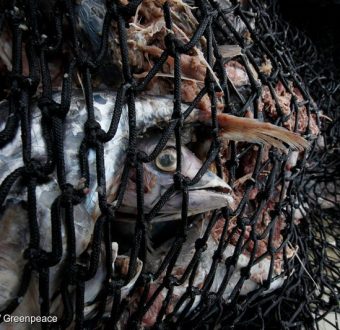Washington, DC, September 30, 2020: For the first time, the U.S. Department of Labor (DOL) has included Taiwan-caught fish in its List of Goods Produced by Child Labor or Forced Labor. The List of Goods is widely considered one of the most authoritative sources on the state of forced labor and DOL’s findings influence the sourcing decisions and human rights plans of many American companies. Fish imported from Taiwanese vessels, the second largest distant water fleet in the world, is sold in supermarkets, cafeterias, and restaurants around the country. As consumers increasingly use DOL’s mobile apps and tools based on the list to inform their shopping decisions, tuna brands such as Bumble Bee will be affected by this.
The decision to add Taiwan to this “dirty list” follows years of investigations and reporting by Greenpeace and other organizations that prove systemic forced labor persists in the Taiwanese fishing industry despite incremental steps taken by the Taiwanese government and fishing industry. The Taiwanese government must immediately adopt the transformative social and environmental reforms needed to significantly reduce forced labor on its fishing vessels, or face economic repercussions from preference for seafood produced legally, ethically, and sustainably.
In response, Pearl Chen, Ocean Campaigner from Greenpeace East Asia said:
“The yellow card from the EU in 2015 prompted Taiwan to make changes to its fisheries regulation. However, despite the strong and widely recognized relationship between illegal fishing and forced labor, Taiwan had largely overlooked the rights of migrant fishers as it reformed its fisheries policies. Migrant fishers are still discriminated against by the two-tiered recruitment system and remain at risk of abuse and forced labor on board Taiwanese fishing vessels. In addition to the government, FCF, a Taiwan-based seafood company and one of the world’s top three tuna traders, should take more responsibility for forced labor risks in its supply chain and be a leader by revamping its business so it fosters an ethical seafood industry that effectively prevents forced labor.”
Andy Shen, Senior Oceans Adviser at Greenpeace USA said:
“The Department of Labor’s decision to put Taiwan-caught fish on its List of Goods Produced by Forced Labor confirms what we have known for many years–the Taiwanese fishing industry is built on the backs of exploited migrant fishers. Major American retailers such as Walmart and Costco, and national tuna brands such as Bumble Bee, source from the Taiwanese fleet and must assure consumers they are not profiting from and perpetuating modern slavery on the high seas. They have a responsibility to use their economic power to change the Taiwanese government and industry’s human rights and environmental policies and practices, and help put an end to forced labor and the illegal fishing and overfishing that drives it.
While today’s announcement is a significant milestone in the global fight against forced labor and illegal fishing, much more remains to be done to eradicate these twin scourges from our planet. Greenpeace calls on DOL to remain principled in their engagement with the Taiwanese government. Structural, not superficial, reforms are needed to fundamentally change the system designed to exploit people and our ocean. DOL must not only demand labor reforms, but also the crucial environmental reforms that would address the root cause of forced labor in Taiwan’s distant water fisheries. Without an end to illegal fishing and overfishing, there can be no end to forced labor on the high seas.”
###
Additional resources:
- List of Goods Produced by Child Labor or Forced Labor
- Greenpeace Briefing on Taiwan for the US Department of Labor 2020 List of Goods Produced by Child Labor or Forced Labor
- Greenpeace Sustainability, Labour & Human Rights, and Chain of Custody Asks for Retailers, Brand Owners and Seafood Companies
Media Contact:
Tyler Kruse
Senior Communications Specialist, Greenpeace USA
[email protected]
808-741-2791





